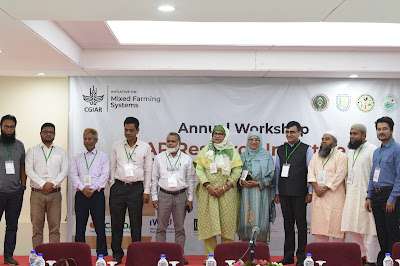The 2024 Annual Activity Review Workshop for the CGIAR Initiative for Mixed-Farming Systems (MFS) project brought together key stakeholders to assess the progress and future directions for sustainable farming in Bangladesh. This initiative addresses the need for resource-efficient, climate-resilient practices by integrating crop and livestock production, providing targeted innovations like crop diversification, improved fodder varieties, and gender-sensitive mechanization. A major takeaway from the workshop was the positive impact of collaborative efforts on enhancing farm productivity, income, and resilience in local communities.
Bangladesh’s agriculture sector faces challenges from climate change, resource scarcity, and the need for increased productivity to support rural livelihoods. The MFS project responds to these issues by promoting sustainable practices, such as crop intensification, homestead gardening, and livestock integration, which are crucial for resilience in vulnerable farming communities. By tailoring innovations to local needs, the project aims to enhance food security, income, and environmental sustainability across the region.
Fostering collaboration
Held on October 29, 2024, the workshop convened partners from IRRI Bangladesh, BRRI, BARI, BLRI, and CIMMYT to review the MFS project’s achievements and challenges from 2023-2024. The workshop aimed to foster collaboration among stakeholders, share insights from the past year, and strategize future actions. Key objectives included assessing progress in sustainable farming practices, enhancing crop and livestock integration, and improving resource use efficiency in farming communities across Bangladesh.
Dr. Humnath Bhandari, IRRI Bangladesh’s Country Representative and the Project Coordinator for CGIAR Initiative on Mixed Farming Systems in Bangladesh, welcomed participants with an inspiring speech highlighting the importance of teamwork and shared goals. Dr. Bhandari emphasized that collaboration among stakeholders is essential for achieving the project’s objectives and making a positive impact on farming communities in Bangladesh. He expresses his gratitude to all the project partners for their outstanding collaboration and efforts.
Dr. Sharif Ahmed presented an in-depth overview of the project, outlining its strategies, notable achievements, and lessons learned over the year. He extended his appreciation to all field staff and partners, acknowledging their dedication to elevating the project to new levels of success.
The workshop featured presentations from key partners who highlighted their contributions and achievements in sustainable farming practices. BRRI demonstrated the benefits of new rice varieties and methods for reducing fertilizer use, while BARI showcased year-round vegetable cultivation and soil management techniques addressing challenges like salinity in coastal areas. BLRI presented innovations in fodder production and poultry farming that provide new income sources for rural families. CIMMYT's Dr. Mponela Powell discussed farm typologies and silage value chain development, underscoring the need for tailored approaches based on farm characteristics. The event concluded with a field visit in Kalapara, where participants gained hands-on insights into the project’s on-the-ground impact.
Workshop highlights
The workshop featured wide-ranging presentations on various topics. These included:
Farm Characterization and Innovation Targeting - Participants reviewed farm typologies to tailor innovations based on farm characteristics and resource availability. Farms were classified into types that focus on rice and aquaculture, small landholdings with high crop diversity, large farms with livestock, and smallholders with off-farm income diversification. Innovations were targeted at active farmers, with a strong emphasis on demographic needs and risk management.
Crop Intensification and Diversification - IRRI highlighted the success of introducing short-duration rice varieties and intensifying the crops by introducing non-rice crops such as mustard, peas, carrots, and potatoes, thereby reducing fallow periods and increasing economic returns. The participants also focused on the challenges of crop intensification and diversification in the Patuakhali regions and how climate-smart production technology such as sorjan, mulching, and crop sowing adjustment can help to cope with the challenges.
Homestead Farming - Presentations on the impact of homestead farming, particularly year-round vegetable and fruit production, composting, and vermicomposting, highlighted its role in elevating household nutrition and income across rural communities.
Gender and Mechanization - Recognizing the role of women in agriculture, the workshop emphasized gender-sensitive mechanization. The project facilitated access to small agricultural machinery for women and youth, enabling them to become machinery entrepreneurs. This approach not only supports income generation but also promotes equal access to modern farming tools for women.
Silage Value Chain Development - With demand for silage on the rise, the Bangladesh Livestock Research Institute (BLRI) highlighted recent efforts to improve livestock feed quality through fodder production. Establishing nurseries and high-yield Napier grass varieties has been instrumental in supporting cattle farming, bolstering rural economies.
Field Visit and Hands-on Insights - The workshop concluded with a field visit to one of the project sites in Kalapara, Patuakhali, where participants observed project activities in action. They engaged with stakeholders and beneficiaries, gaining firsthand insights into field-level challenges and successes. This experience provided an invaluable perspective on the real-world application of SI-MFS strategies and their positive impact on local farming communities.
Key Takeaways and Future Goals
Several key takeaways and future plans were developed during the workshop. These included::
Fodder Seedling Management: BLRI intends to advance fodder seedling techniques to enhance livestock feed quality.
Homestead Gardening: Expanding homestead gardening in unused spaces is expected to further improve household nutrition and income.
Strengthening Local Services: IRRI plans to improve market connections, ensuring farmers’ access to quality seeds and inputs.
Urea Deep Placement: BRRI aims to implement urea deep placement to boost nitrogen efficiency and curb greenhouse gas emissions.
Adapting Rice Varieties: Medium-duration rice varieties may offer better suitability for Patuakhali's conditions, with potential benefits for both long- and short-duration crop cycles.
The workshop’s insights and innovations have laid a foundation for addressing food security and sustainable agricultural development in Bangladesh, promising improved outcomes for rural farmers and their communities.
###
Learn more about IRRI (www.irri.org) or follow us on social media and networks (all links down the right column).





No comments:
Post a Comment